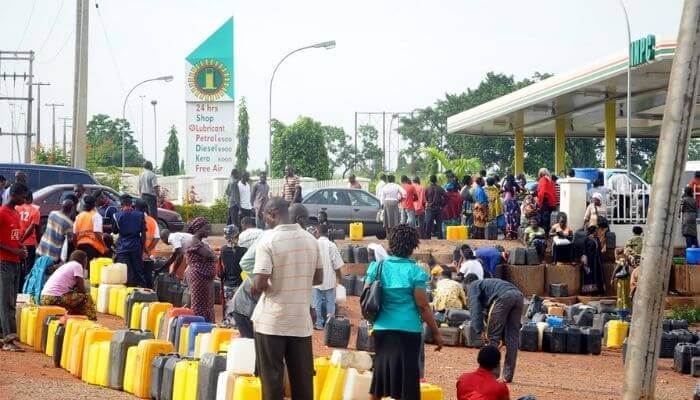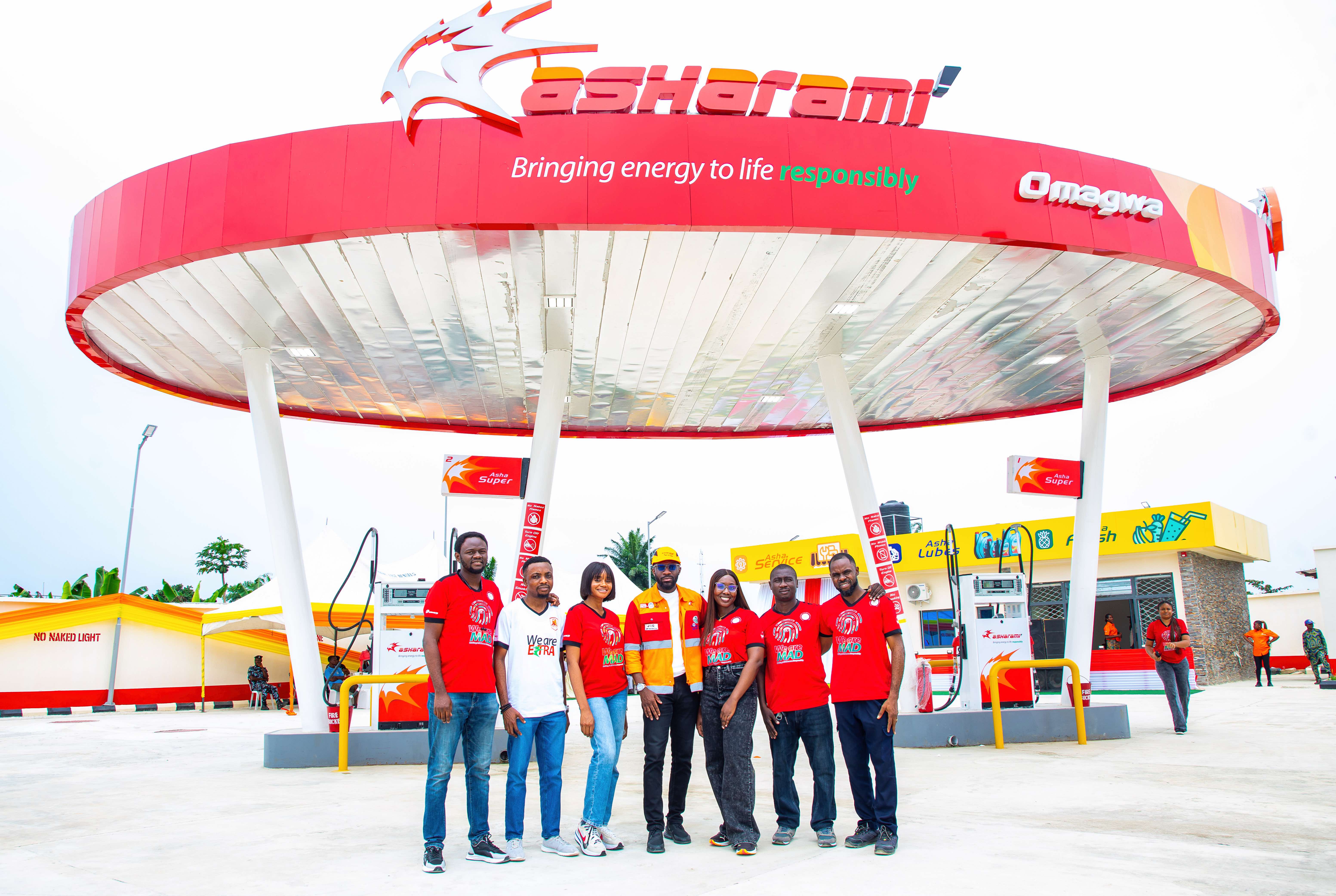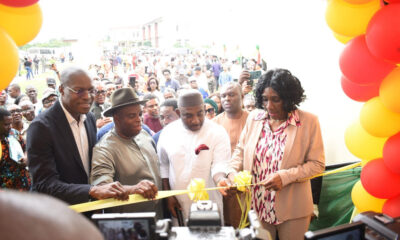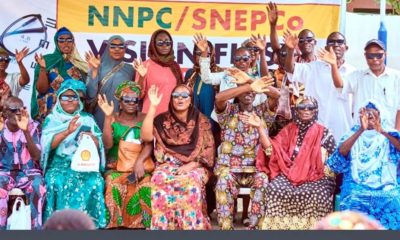Energy
Another Round Of Fuel Crisis Looms, PMS Goes For N900/Litre

The streets of Lagos and Abuja, Nigeria’s economic and political capital cities, respectively, appear to be drifting into another round of energy crisis, with Premium Motor Spirit (PMS), popularly called petrol, selling for N900/litre.
Biztellers reports that this follows the raising of ex-depot price of petrol from N630 to N720/litre by private depot owners.
The immediate response of petrol stations within the Lagos and Ogun States axis has been to declare scarcity, which has triggered panic among the populace.
It was gathered some dealers were reluctant to purchase products at the new rates from the private depots.
The National Vice President of the Independent Petroleum Marketers Association of Nigeria (IPMAN), Hammed Fashola, was cited by The PUNCH as declaring that many filling stations did not open for business because they had no fuel in their tanks.
READ ALSO: Economic Conspiracy: Dangote Accuses IOCs Of Plotting Against Nigerian Refinery
According to Fashola, the Nigerian National Petroleum Company Limited, which is the sole importer of petrol at the moment, should explain to Nigerians what was happening with the product.
In his words, “Those that shut their stations do not have fuel to sell. When you don’t have fuel, you cannot open your station. That is the problem. You know the NNPC is the sole importer of this product. I think it is in the best position to tell us what is actually going on.
“Currently, independent marketers cannot buy what the private depots are selling. They are selling fuel between N715 and N720 per litre. How much will marketers sell the product? Look at the cost of bringing it to their depots; with transportation and other depot expenses, it will be too costly for them. That is why the stations are shut down.
“Some marketers refuse to go and buy because they know the masses cannot afford high-priced petrol in this economy. That is the situation for now.”
Biztellers reports that private depot owners, used to sell petrol to independent marketers at the rate of N630-650/litre, while the NNPC Ltd was selling to major marketers at a price below or around N600.
The pending negotiations between the IPMAN and the NNPC Ltd for direct supplies to its members has not borne fruits.
Biztellers gathered that the NNPC Ltd, instead of seeking a lasting solution was focused on a temporary reprieve by pressuring the private depots in Apapa to prioritise supply to Abuja to dispel mounting fuel queues.
Industry watchers are tracing the short supply to the Lagos and its environs, to the efforts to solve the queues mounting in the Abuja area by shifting supply focus there.
Energy watchers are concerned because the signals appeared too soon after the Reuters averred that Nigeria’s debt to PMS suppliers had surpassed $6bn, doubling the figure as at April. It traced the surge to NNPC Ltd’s failure to bridge the gap between fixed pump prices and international fuel costs.
The Reuters report had asserted that the crisis had long brewed with part of January imports, put between $4bn and $5bn still outstanding to suppliers.
The debt pile-up is being managed, according an unnamed industry source, with “the $250,000 a month (per cargo) for late payment compensation,” the PUNCH wrote.
Even at that, at least two suppliers were said to have stopped participating in recent tenders after hitting self-imposed debt exposure limits to Nigeria, meaning they would not supply more PMS until they receive payments.
As a consequence, Reuters noted, Nigeria’s tenders to buy gasoline in June and July were smaller.
The NNPC Ltd was expected to import via tender about 850,000 tonnes in July, according to the Reuters report quoting sources, down from the typical one million tonnes in previous months.
As that is brewing, some private depot owners have been showing reluctance to supply petrol to independent marketers, who own the larger percentage of the filling stations in Nigeria.
The depot owners on their part, claim they could only distribute what they were supplied by the sole importer, the NNPC Ltd.
One of the depot owners, was cite thus, “Currently, we focus on our filling stations. We get less than 50 per cent of what we usually get from the NNPC now.
So, we make sure we feed our stations first before we consider selling to independent marketers. That is why most of them are out of stock. You know they don’t have access to the NNPC and the little we get is not even enough for our stations,” by The PUNCH.
The IPMAN president had fingered the supply chain, “The current situation is a result of the way private depot owners have been selling their products. It has been very difficult for independent petroleum marketers to get the product and sell it in Abuja and neighbouring states, as well as in other states in the North.
“So the queues you are seeing now are because of the cost of PMS by private depots. The private depots are selling at N710/litre, but if you check the price of the same product at NNPC retail outlets, it is N617/litre.
“Therefore, by the time we independent marketers buy from private depots and bring it to our filling stations, we will not be able to sell our product because our cost price is already so high, while the cost at NNPC retail outlets is far lower.
“And you know that when we buy it at the rate of N710/litre we have to add transportation cost again because there is no equalisation. And when we add the cost of transportation, the pump price is going to be higher than the N710/litre ex-depot price, whereas NNPC stations sell at N617/litre.”
He maintained that the number of stations operated by IPMAN, meant that any distortion in the supply of products to its members would eventually lead to fuel queues because major marketers and NNPC stations are fewer.
Energy
Asharami Synergy Unveils Fuelling Solutions In Omagwa

In line with its commitment to driving access to quality petroleum products, Asharami Synergy Limited, a leading Sahara Group downstream company, has said the public can now access exceptional fuelling solutions at its newly commissioned retail station in Omagwa, Rivers State.
Situated strategically along the Airport Road in Omagwa, the station, which features a storage capacity of 45,000 litres each for Automotive Gas Oil (AGO, also known as diesel) and Premium Motor Spirit (PMS, also known as petrol) is equipped with two pumps and four discharge nozzles for PMS and AGO.
The facility also has ample space for sundry services in a bid to ensure consumers get more “miles and smiles” as well as the energy to “go further” with Asharami’s world-class products.
“The Asharami Omagwa Retail Station is fully operational, offering a range of premium products and services. It’s a one-stop shop that also gives our esteemed customers eat-in and take-out restaurant services, shopping, as well as the Asha lubricants and Asha Service experience which will ensure premium care for all classes of automobiles and engines,” said Oladimeji Williams, Head, Government Relations and Business Development at Asharami Synergy.
ALSO READ: NNPCL Launches Utapate Crude Oil Blend, Eyes Production Expansion In 2025
At the Commissioning, Willaims said the new station represents an important step in Asharami Synergy’s expansion plan aimed at reaching and serving more communities responsibly. “This station is strategically positioned close to the airport, serving as the gateway for powering socio-economic development in the community and those close to it, while enabling Asharami Synergy integrate all aspects of its downstream business towards ensuring efficiency and value for our customers,” he stated.
Williams commended the Federal Airport Authority of Nigeria (FAAN) and the Omagwa community leaders for their support and collaboration throughout the project’s duration, describing it as a “seamless and productive process that highlights Asharami’s corporate stewardship and social impact” in the community.
Similarly, Ifesinachi Ezike, Regional General Manager (South South), FAAN, emphasized the broader significance of the new station, stating, “This occasion marks a significant milestone not just for Asharami Synergy but for the airport and the entire community. It marks not just an opening of a new facility but the beginning of a renewed commitment to enhancing the travel experience of all our passengers and stakeholders”.
In a move that underscores its commitment to sustainability and community development, Asharami Synergy also commissioned a solar-powered borehole during the launch. The borehole is set to improve access to clean and reliable water for residents, marking a tangible contribution to the local community.
“At Sahara, we are always making a difference—not just through our business operations; we are unwavering in our commitment to driving sustainable development and building partnerships that enhance the well-being of our host communities,” Williams added.
Energy
Awards Galore For Shell, Staff At NAPE 2024 Conference

The Shell companies in Nigeria and staff won awards in recognition of their robust participation at the 42nd Annual International Conference and Exhibition of the National Association of Petroleum Explorationists (NAPE), held in Lagos.
At the closing dinner of the event, the Managing Director of Shell Nigeria Exploration and Production Company (SNEPCo), Ronald Adams pledged sustained efforts by the company to address “the Nigerian energy trilemma by powering progress towards energy security in a sustainable manner”.
On the awards, the Shell was declared Best Overall Exhibitor and Best Exhibiting Energy company (International) just as Geophysicist Somime Oguntola took home the Award of Excellence for Oral Paper (second place).
The icing on the cake was a Shell staff, Johnbosco Uche, being installed as the new President of the NAPE.
It was gathered that the Shell companies in Nigeria have supported NAPE since its founding in 1975, using the skills and expertise of the large pool of energy professionals in its employment to improve its activities especially educational and mentoring programmes.
In addition to being a major sponsor of the 2024 conference, Shell mounted a high-profile exhibition, featuring among other things, career counselling, engagements on Nigerian Content and Contractor development and panel sessions on Women in Industry and Sustainability Energy Challenge.
A highlight was the Shell medical stand which attended to more than more than 500 conference participants and members of the public over the four days of the annual event. The doctors and nurses offered a wide range of services including laboratory tests, deworming, medical consultation as well as ophthalmology checks and distribution of nearly 300 eyeglasses.
Adams referred to the operations of SNEPCo as an example of Shell’s contribution to energy security in Nigeria. “As a result of sustained production from Bonga, we have provided funds to finance development, created a new generation of Nigerian Deepwater professionals, empowered indigenous contractors and service providers, and implemented social investments that have touched lives in the six geo-political zones of the country,” he said.
Adams added, “SNEPCo and indeed Shell are in Nigeria for the long haul. Our commitment is reflected in both our current and growth plans, all of which are grounded in principles of safety, affordability, and competitive performance.”
Energy
Accugas Denies Culpability In Akwa Ibom’s Power Outage

Owing to the persistent power outage, which has crippled economic and social life in most parts of Akwa Ibom State and environs, Accugas Limited has washed its hands off the ugly situation.
This was contained in a statement under the signature of its Communications Manager, Okwudili Onyia, in which the company traced the anomaly to a “fault in the 132-KV Aba-Itu transmission line”.
To ameliorate the situation, the company maintained that “It is imperative that the restoration of the Aba-Itu line is completed as soon as possible.”
In addition, the company pledged thus, “Accugas will continue to partner with, and support, the government of Akwa Ibom State towards achieving the government’s agenda for economic development and prosperity of the state.”
ALSO READ: NNPC Ltd To Supply 100mmscf/d Gas To Dangote Refinery
The statement reads, “Accugas Limited, a subsidiary of Savannah Energy, wishes to strongly deny the misinformation concerning its alleged involvement in the current power outage in Akwa Ibom State.
“The power cut in Akwa Ibom State is entirely due to the reported fault in the 132-KV Aba-Itu transmission line, which, unfortunately, is preventing power being transmitted from the National Grid into the State. It is imperative that the restoration of the Aba-Itu line is completed as soon as possible.
“Ibom Power Company (“IPC”) is one of 23 thermal power generation companies which channel power to the National Grid, which in turn disseminates all accumulated power to each State of the Federation through the electricity distribution companies (“Discos”). Indeed, Accugas supplies gas to enable c. 20% of Nigeria’s thermal generation capacity and, as such, is a critical enabler of the Nigerian economy.
“Within Akwa Ibom State, Accugas has been the sole supplier of gas to IPC since 2014 and, together with other Savannah subsidiaries, has invested over US$1.5 billion in gas development within the state. Furthermore, Savannah has recently invested c. US$45 million in a gas compression project at Accugas’ Uquo central processing facility at Esit Eket. Accugas’ commitments also extend to several social investment projects in the state. All the foregoing investments and projects, including other imminent investments Accugas intends to make in the State, demonstrate the Company’s long-term commitment to Akwa Ibom State and Nigeria.
“Accugas will continue to partner with, and support, the government of Akwa Ibom State towards achieving the government’s agenda for economic development and prosperity of the state.”


















